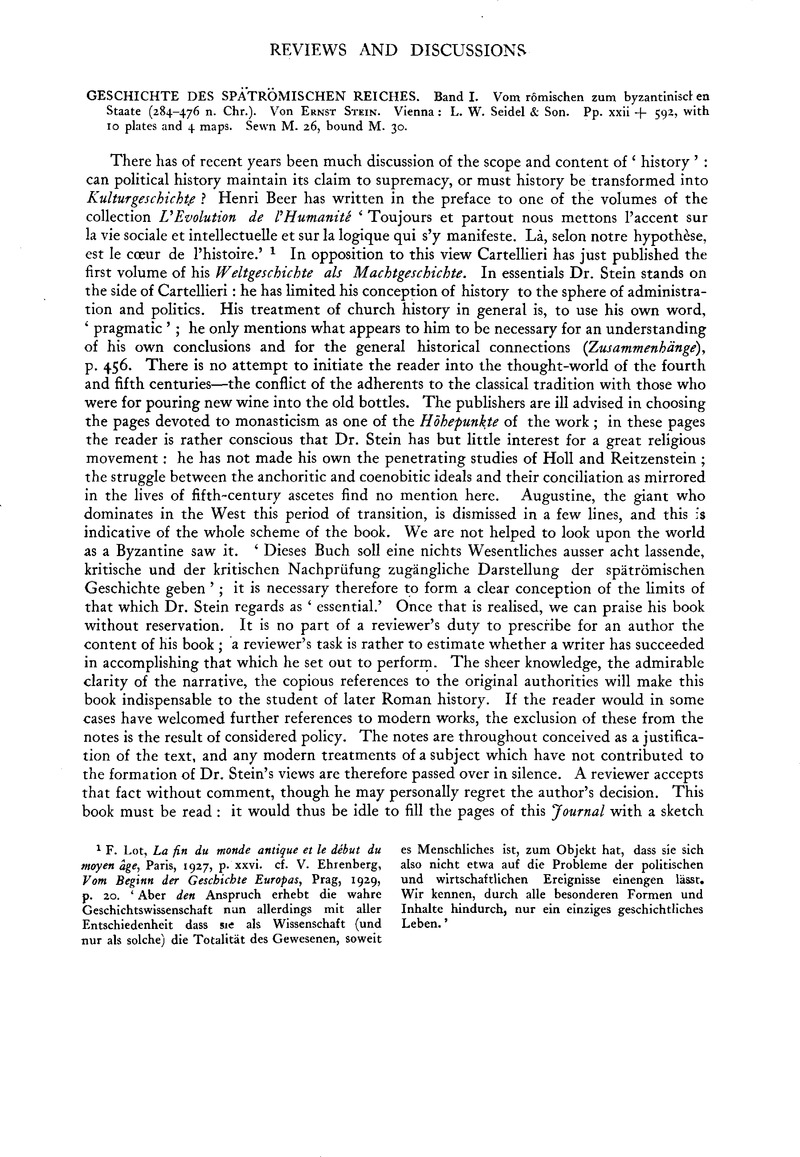Published online by Cambridge University Press: 24 September 2012

page 217 note 1 Lot, F., La fin du monde antique et le début du moyen âge, Paris, 1927, p. xxviGoogle Scholar. cf. Ehrenberg, V., Vom Beginn der Geschichte Europas, Prag, 1929, p. 20Google Scholar. ‘Aber den Anspruch erhebt die wahre Geschichtswissenschaft nun allerdings mit aller Entschiedenheit dass sie als Wissenschaft (und nur als solche) die Totalität des Gewesenen, soweit es Menschliches ist, zum Objekt hat, dass sie sich also nicht etwa auf die Probleme der politischen und wirtschaftlichen Ereignisse einengen lässt. Wir kennen, durch alle besonderen Formen und Inhalte hindurch, nur ein einziges geschichtliches Leben.’
page 218 note 1 If Severus was praetorian prefect and not praefectus urbi (Regesten, p. 62), there will be no need to transfer this constitution to 325/6 as Mommsen proposed.
page 219 note 1 Personally I feel that there is considerable point in the remark of Schwartz: ‘Das Consulat der beiden Caesaren, Crispus und Constantin, von 324 erklärt sich am besten als unmittelbare Folge des Sieges über Licinius an dem Crispus einen hervorragenden Anteil gehabt hatte.’ Göttinger Nachrichten, 1911, p. 370 n. 1.
page 219 note 2 Such examples of surprisingly late post-consular datings as B.M. 1773, Oxy. 1889, Oxy. 1899, adduced by Mr. Bell, come from the fifth century, when the nominations of consuls were no longer contemporaneous.
page 220 note 1 The chronology of the early days of the Arian controversy is too obscure for us to state with certainty that the synods held at Nicomedia and Caesarea took place after the defeat of Licinius; here I cannot follow Elsa Kluge.
page 220 note 2 ‘Mit vollem Recht ist Seeck der weder aus den Geschichtsquellen noch aus der Geschichte selbst … zu motivierenden Ansicht entgegengetreten als sei die Gründung von Konstantinopel eine geniale Tat von epochemachender weltgeschichtlicher Bedeutung gewesen,’ p. 194.
page 220 note 3 Lot, F., La fin du monde antique, etc. Paris, 1927, p. 43Google Scholar. cf. Stein, E. in Gnomon iv (1928), pp. 410Google Scholar sqq. It might appear to be a plea pro domo if I amplified this point here.
page 220 note 4 F. Lot op. cit. p. 47.
page 220 note 5 Göttinger Nachrichten, 1911, pp. 403–6, 421–3Google Scholar.
page 221 note 1 Schwartz's study of the relations between Constantine and Arius has convinced me. Unfortunately when I wrote my own Athanasiana [Journal of Egyptian Archaeology, xi (1925), 58–69Google Scholar] I was under the impression that the series of papers published by Schwartz in the Göttinger Nachrichten had ceased with the year 1908. In view of Schwartz's articles published in 1911 I disavow my own discusion of the recall of Arius from exile. But Schwartz has only strengthened the case for my suggestion that Socrates preserved the truth when he wrote ϕασι δέ τινες τοῦτο, i.e. the exile of Athanasius, πεποιηκέναι τὸν βασιλέα σκοπῷ τοῦ ὲνωθῆναι τὴν ὲκκλησιαν ὲπειδὴ Άθανάσιος πάντη κοινωνῆσαι τοῖς περὶ Άρειον ὲξετρέπετο.
page 221 note 2 Epiphanius.
page 221 note 3 Eusebius, c. Marc. 2, 4. How Schwartz knows that no bishop from the diocese of Oriens was present at the Council I cannot guess. The Sardican encyclical speaks of bishops qui ex multis orientalium provinciis advenerunt. Hilary, frag. hist. 3, 3.
page 221 note 4 Schwartz admits that he cannot suggest another date, Nachrichten, 1911, p. 406.
page 221 note 5 cf. Journal of Egyptian Archaeology, xi (1925 p. 64Google Scholar.
page 221 note 6 Karl Müller, ‘Beiträge zur Geschichte der Verfassung der alten Kirche’. (Abb. d. Preuss. Akad. d. Wiss. Jahrgang 1922. Phil.-hist. Klasse no. 3) Einzelausgabe, p. 17.
page 222 note 1 For a judgment upon the reliability of Epiphanius in his treatment of the later heresies cf. Schwartz, , Nachrichten, 1905, pp. 165–6Google Scholar.
page 222 note 2 Holl, Karl, Gesammelte Aufsätze zur Kirchengeschichte, Tübingen, 1928, pp. 288–9Google Scholar.
page 222 note 3 Dr. Stein's suggestion that the Persian failure before Nisibis is sufficient explanation is hardly convincing (p. 212). On the other hand the news of Hannibalian's success might have caused the Persians to withdraw; cf. Libanius. of Constantius, (Forster, iv, p. 24511) ![]()
![]() .
.
page 222 note 4 Has it been noticed by modern writers that Constantine apparently had not intended to command the army in the person in the war with Persia ? (Libanius, Forster, iv, p. 244). Constans was, it seems, to be recalled to take the place of Constantius, who was to act as general.
page 222 note 5 Heering, Walter, Kaiser Valentinian I (364–375 n. Chr.) Jena Dissertation, 1927Google Scholar. Faber'sche Buchdruckerei, Magdeburg.
page 223 note 1 Rivista di Filologia, vi (1928), pp. 578–9Google Scholar.
page 223 note 2 The mistake of Ammian is that he has not expressly said that it was the news of the Roman defeat which was brought to the emperor; his text might suggest that the message only informed him of the Alamannic invasion. Of that he must have heard in Italy, and it was doubtless that invasion which had caused him to leave Milan. It is the failure of Ammian to mention in so many words at this point in his summary the defeat of Charietto which has misled modern students of his history.
page 224 note 1 Hermes, xli (1906), p. 490Google Scholar.
page 224 note 2 Is Sidonius, Pan. 9–12, more than a highly diplomatic reference to the fact that at first Leo had appointed Majorian magister militum and not Augustus ?
page 225 note 1 Seeck, , Geschichte des Untergangs, etc., vi, p. 479Google Scholar.
page 225 note 2 cf. p. 219, n. 2 supra.
page 225 note 3 See the material collected in Liebenam, W., Fasti consulares, p. 47Google Scholar.
page 225 note 4 cf. J.R.S. XII (1922), pp. 222–4Google Scholar.